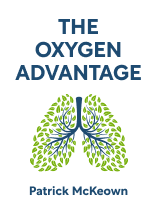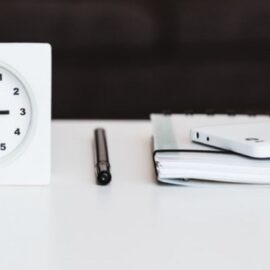

This article is an excerpt from the Shortform book guide to "The Oxygen Advantage" by Patrick McKeown. Shortform has the world's best summaries and analyses of books you should be reading.
Like this article? Sign up for a free trial here.
What’s the best way to improve your breathing? What are the benefits of breathing through your nose?
Breathing specialist Patrick McKeown’s main recommendation that anyone can use to improve their breathing is to exclusively breathe through the nose, not the mouth. The primary reason nasal breathing is so healthy is that it naturally limits the air you can breathe.
Let’s check out the other benefits of breathing through your nose, according to The Oxygen Advantage.
Benefit #1: Naturally Diaphragmatic Breathing
The diaphragm is the muscle at the bottom of your chest cavity that moves while you breathe. According to McKeown, people who breathe through their nose benefit from naturally diaphragmatic breathing—while breathing, they fully flex the diaphragm. Diaphragmatic breathing is what experts mean by healthy “deep” breathing—your breath reaches deep into your lungs.
Diaphragmatic breathing is one of the main benefits of breathing through your nose because it activates the parasympathetic nervous system—the network of nerves that causes you to relax in safe environments—taking you out of fight-or-flight mode, which helps you avoid instinctively breathing too much. By contrast, mouth breathers often breathe using just their upper chest, with minimal movement of the diaphragm—therefore, they don’t experience these benefits.
(Shortform note: If you’re emotionally overwhelmed, you may find it challenging to breathe diaphragmatically through the nose—for instance, people having an anxiety attack often feel like they can’t control their breathing. What can you do to calm down in this case? In The 5 Second Rule, Mel Robbins recommends reframing your anxiety as excitement by repeating to yourself how excited you feel about something. This way, your brain will reinterpret the physiological symptoms of stress as a good thing rather than a sign of danger, allowing you to more easily activate the parasympathetic nervous system and escape the cycle of hyperventilation.)
Benefit #2: Better Respiratory Hygiene
Nasal breathing is essential to proper hygiene within your respiratory system, asserts McKeown. Air you inhale through the nose is healthier than air you inhale through the mouth. Inside the nose, there’s a complex system of twisting bones, passageways, and layers of mucus. This system strips harmful germs out of the air, warms the air up, and adds moisture to it before allowing the air to pass into the lungs.
(Shortform note: Although your nose naturally filters, warms, and moistens the air you breathe, some experts note that your breathing will be even healthier if the air you breathe is already clean, warm, and moist. Frequently open windows in your home and activate exhaust vents to keep air moving and avoid the buildup of airborne particles. Wear a scarf around your face in cold weather to warm air before it reaches your nose. Last, if the air in your house is dry, consider using a humidifier or taking a steamy hot shower. These steps may help you avoid getting sick, as dry air can cause inflammation and infection in your airways. Cold air is unhealthy primarily because it’s dry—it can’t hold as much moisture as warm air.)
Mouth breathing, on the other hand, causes you to lose moisture every time you take a breath, increasing the likelihood of general dehydration and a dry mouth. In particular, having a dry mouth increases the likelihood of mouth infections, including cavities and gum disease, and it often results in bad breath.
(Shortform note: Why is a dehydrated mouth prone to infection? The saliva in your mouth contains many compounds that kill bad bacteria, including hydrogen peroxide, lactoferrin, and lysozymes. If you dry out your mouth with excessive mouth breathing, you allow this bacteria to infect your mouth—and, in some cases, your airways. This can cause respiratory infections.)
Benefit #3: Increased Nitric Oxide
McKeown asserts that nasal breathing makes you healthier by increasing the nitric oxide in your body. Your nose naturally produces this gas, and you get more of it in your body every time you breathe in through your nose. Nitric oxide helps your blood vessels remain relaxed and open, increasing blood flow and improving cardiovascular health. It also lowers your blood pressure and cholesterol, and it reduces the risk of heart attack or stroke.
(Shortform note: To further boost your body’s production of nitric oxide, thereby improving your cardiovascular health, some experts recommend eating foods that are high in nitrates. These are compounds that the body can convert into nitric oxide. Nitrate-rich foods include vegetables such as celery, lettuce, and spinach. Nitrates are also sometimes added as a preservative to meat products like bacon and cold cuts, but the nitrates in these products aren’t balanced out by antioxidants and other nutrients like they are in vegetables, so they form different compounds. Some research shows that these compounds may cause cancer.)
Benefit #4: Improved Sleep
Nasal breathing helps improve your sleep quality, according to McKeown—it helps you fall asleep faster, stay asleep more easily, and wake up with more energy to start your day. Additionally, it decreases the likelihood that you’ll suffer from snoring or sleep apnea.
If you wake up with a dry mouth in the morning, it’s a sign that you’re breathing through your mouth while asleep. In this case, put paper tape or commercially available sleep tape over your mouth just before you go to bed until you’ve built the habit of sleeping with your mouth closed.
(Shortform note: Arguably, sleep problems and morning grogginess are so widespread because mouth breathing is more common at night than any other time of day. Lying flat on your back causes more blood to flow up into your nasal passages, which causes swelling and nasal congestion. This understanding reveals an additional solution to nighttime mouth breathing: If you find taping your mouth shut at night to be too uncomfortable, use pillows to elevate your head and upper back at a 30- to 60-degree angle, mitigating blood flow to your nasal passages and clearing up congestion.)

———End of Preview———
Like what you just read? Read the rest of the world's best book summary and analysis of Patrick McKeown's "The Oxygen Advantage" at Shortform.
Here's what you'll find in our full The Oxygen Advantage summary:
- How proper breathing can help you lose weight, sleep better, and more
- How modern living conditions cause people to breathe too much
- Training exercises to help you breathe less and build CO2 tolerance







The benefits of nasal breathing during exercise were particularly eye-opening for me. I’ll definitely try to focus on breathing through my nose during my next workout to see if it makes a difference in my performance.